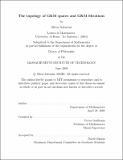The topology of GKM spaces and GKM fibrations
Author(s)
Sabatini, Silvia
DownloadFull printable version (783.8Kb)
Other Contributors
Massachusetts Institute of Technology. Dept. of Mathematics.
Advisor
Victor Guillemin.
Terms of use
Metadata
Show full item recordAbstract
This thesis primarily consists of results which can be used to simplify the computation of the equivariant cohomology of a GKM space. In particular we investigate the role that equivariant maps play in the computation of these cohomology rings. In the first part of the thesis, we describe some implications of the existence of an equivariant map p between an equivariantly formal T-manifold M and a GKM space fM. In particular we generalize the Chang-Skjelbred Theorem to this setting and derive some of its consequences. Then we consider the abstract setting of GKM graphs and define a category of objects which we refer to as GKM fiber bundles. For this class of bundles we prove a graph theoretical version of the Serre-Leray theorem. As an example, we study the projection maps from complete flag varieties to partial flag varieties from this combinatorial perspective. In the second part of the thesis we focus on GKM manifolds M which are also T-Hamiltonian manifolds. For these spaces, Guillemin and Zara ([GZ]), and Goldin and Tolman ([GT]), introduced a special basis for H* T (M), associated to a particular choice of a generic component ? of the moment map, the elements of this basis being called canonical classes. Since, for Hamiltonian T spaces, HT (M) can be viewed as a subring of the equivariant cohomology ring of the fixed point set, it is important to be able to compute the restriction of the elements of this basis to the fixed point set, and we investigate how one can use the existence of an equivariant map to simplify this computation. (cont.) We also derive conditions under which the formulas we get are integral. Using the above results, we are able to prove, inter alia, positive integral formulas for the equivariant Schubert classes on a complete flag variety of type An,Bn,Cn and Dn. (These formulas are new, except in type An). More generally, we obtain positive integral formulas for the equivariant Schubert classes using fibrations of the complete flag variety over partial flag varieties, and when this fibration is a CP1-bundle one gets from these formulas the calculus of divided difference operators. [GT] Goldin, R. F. and Tolman, S., Towards generalizing Schubert calculus in the symplectic category, preprint. [GZ] Guillemin V. and Zara C., Combinatorial formulas for products of Thom classes. In Geometry, mechanics, and dynamics, pages 363-405, Springer NY, 2002.
Description
Thesis (Ph. D.)--Massachusetts Institute of Technology, Dept. of Mathematics, 2009. This electronic version was submitted by the student author. The certified thesis is available in the Institute Archives and Special Collections. Includes bibliographical references (p. 141-142).
Date issued
2009Department
Massachusetts Institute of Technology. Department of MathematicsPublisher
Massachusetts Institute of Technology
Keywords
Mathematics.